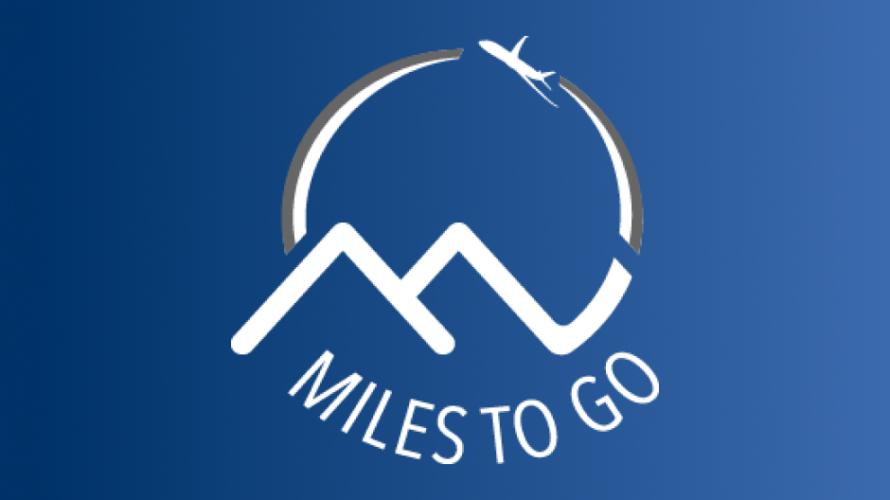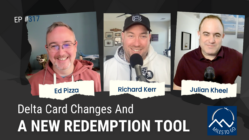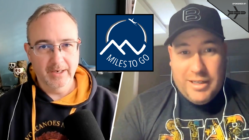Speaker 1: You're listening to the Miles to Go podcast, the go-to source for travel tips, news, and reviews you can't afford to miss. Now, here's your host, travel expert, Ed Pizza.
Ed Pizzarello: Hey guys, welcome back to the Miles to Go podcast. I've got a bit of good news and some bad news this week. For those that listened to the first part of my most recent camping adventures with Richard Kerr last week, we're going to hold off on part two in lieu of this week's topic. That might be good news for some, but the bad news for the rest of you is you do get another dose of Mr. Kerr this week. He's joined today by Kyle Potter from Thrifty Traveler. For what I can only imagine will be a spirited discussion on what we all think the future holds for the price of airline tickets and how valuable that big pile of points and miles that you amassed during the pandemic is likely to be as we move into something more normal.
Before I turn these two bulls loose in the China shop, a quick reminder that if you have questions or topics you'd like to see us cover on a future show, you can email me at ed@pizzainmotion.com and you can always find me on social media. Twitter, Facebook, and Instagram, all @pizzainmotion. Kyle, welcome back to the show.
Kyle Potter: Yeah, Ed, thanks for having me. I'm excited to talk about this.
Ed Pizzarello: And with your recent trip to Cap Cana, and Mr. Kerr, you going to the Bahamas. You two are significantly more tan than I am right now.
Richard Kerr: Well that's true all the time. And Kyle, I don't know what your negotiated appearance fee was for this today, so I recommend you double it next time. Ed doesn't pay enough.
Kyle Potter: It's actually another trip to Cap Cana. So, Ed, I look forward to that.
Ed Pizzarello: Hey, look, you want to take a seven inch swab up your nose, all good by me. Hey, quick reminder before we get too deep into things here, if you guys haven't stopped listening to the episode by now, it'd be awesome if you could tell a friend about Miles to Go. Super helpful for us, and there's a link in the show notes that allows you to leave us a rating and a review in less than a minute. Those are a really big help to us. All right, so teeing this up, this was Kyle's idea. And credit where credit is due, so if the show is horrible you should write to him @thriftytraveler.
But Kyle posed the question of, "Hey, what do we think's going to happen in the future? Where do we think airline prices are going? And what should we expect for our points and our miles to be worth? How often are we going to find saver inventory, if you will, that unicorn?" So, Kyle, since it was your idea, you get the floor first. What do you think, with whatever you're sitting on right now for your pile of points and miles, what has you the most worried that you're not going to be able to get good value for?
Kyle Potter: Can I say everything? Is that okay?
Ed Pizzarello: Hey man, the mic is yours.
Kyle Potter: Look, I mean, it's been a year. A year plus of, at its core, people continuing to earn miles and not using them. I mean, yes, people still were traveling throughout the last year of the pandemic. But by all accounts, the rate at which people were earning miles has far outpaced how much they've redeemed them in the last year. Then you add in the fact that over the course of the last year, and especially probably the last six to nine months, we've seen Amex, and Chase, and all the big banks, and all the big airlines come out with, in many cases, the absolute largest bonuses that we've ever seen.
So, I mean, there's just billions upon billions of points and miles sitting out there. And the writing is, to me, on the wall. There's only one way for this to get fixed, and that's through devaluations. We've already seen some of it from some airline and hotel programs. And I think that can only continue because there are so many unused points and miles out there.
Ed Pizzarello: Yeah, and I mean, I hear the term devaluation used a lot in our community. I get it. It's not one of my favorite terms though. As we all know, these award chart increases are not few and far between. I mean, I earned a bunch of extra points during the pandemic because of, as you say, big sign-up bonuses. There were plenty of bonus categories, ways to save along the way. But it was hard to find four saver award tickets for my family to fly somewhere on United prior to the pandemic. Mr. Kerr, you talk a lot about Delta and where you've seen the value shift in that program. Certainly not necessarily in the domestic coach awards, but when you look at the landscape and what you're hanging onto in your pocket, what do you think about how you're going to be able to redeem your points and miles over the next, call it 18 months?
Richard Kerr: Similar opinion to Kyle. I'm certainly not hopeful that we're going to see any kind of valuations anytime soon. I have a tweet going with a thread now of all the no notice devaluations over the last month. So far we're at BA, British Airways. IHG, Expedia group in their price line points. And Delta. And I think there might have even been another one. So, it's going to continue. There's way too many points and miles on the books. Airlines needed to do everything they could over the last year to maintain customers. Now with the pent up demand and the things we're already seeing, I don't think they have to try so hard. People are going to travel at least domestically on leisure all summer and all fall.
So, what I'm doing is kind of collecting more of the revenue based points, or the most flexible points possible. So Capital One Venture Miles, all the transferrable currencies. Giving myself plenty of options so that I'm not locked into a single program. So unlike you Ed, I'm not putting a gajillion dollars to spend on my Delta co-branded card, because I want the flexibility, and I'm not sure exactly what Delta is going to do.
Ed Pizzarello: Yeah, look, I made that decision. No question, which I talked about it on the air. And I mean, maybe it was the right decision, maybe it wasn't. I think we're going to figure that out. I do want to talk about points and miles for a second, but I want to ask you a question, Richard. Just because of your closeness to the Delta program down in Atlanta. Because Delta, I think has been sort of out there on the bleeding edge in terms of what they're doing to make changes. What do you think of Delta's most recent changes in terms of trying to help folks keep elite status? Is it worth it to chase status?
Richard Kerr: Yeah, it's great. Hey, look, I've been in proponent of SkyMiles throughout all of this, because I still get value for SkyMiles for my family, for domestic coach economy tickets all the time. Especially with close in lately, I was looking at Hawaii tickets actually yesterday, and it's 600 bucks or 40,000 miles on Delta. And I'm like, "Hey, that's one point. That's way more than one cent per point." So, I mean, I have a stash of SkyMiles I keep and burn on the hops around here. And then all the changes, the bonus NQM's, the ability to redeem your RUC's and GUC's online, earned bonuses on award tickets now. It's all great stuff, and I still think it's hard to argue that anybody else gives you a better actual flight experience than Delta domestically. So, fly them. I'll continue to fly them. Flying them to Vegas in a couple of weeks. But as far as where my spin goes, it's not going to be on a Delta co-branded card right now,
Ed Pizzarello: Ladies and gentlemen, if you were reading between the lines there, that was him saying that he disagrees with everything that I do, again.
Richard Kerr: No, you have a lot more capacity than I do. I think your idea to chase diamonds, not bad. I know Kyle, you're in Minneapolis, right? So Delta hub number two. What do you think about what Delta's got going on?
Kyle Potter: Yeah, I think it's great. I mean, in some ways it's hard to compare SkyMiles to some of the other major airline programs, because they're just different animals. And that's in large part due to what Richard touched on. Delta, to me, again, Richard and I are both hub captive, so we don't really have a choice. But, Delta is, in my opinion, the best of the major US carriers. And they know that, and they treat SkyMiles accordingly. So if you can adjust your expectations and view SkyMiles as a way to book cheap domestic fares with SkyMiles, and now earn towards Delta medallion status to boot. Add in also the fact that SkyMiles tickets are fully cancelable and you can get your SkyMiles right back if your plans change so long as you book within the next couple of weeks. I don't see a better way to book, especially domestic travel in the United States right now, than Delta SkyMiles.
Richard Kerr: Do you have the same effect we have here in Atlanta? And when I talk to friends and family that are not in the points and miles, travel hardcore space, they tell me they're going on a trip and I say, "Who are you flying?" And they look at me like, "Delta?" Like, "Who else would I fly?" Whereas me on the other hand, Southwest has a robust route network here, Frontier just announced eight new routes. We do have other options, but nobody here seems to recognize that. Is that the same in MSP?
Kyle Potter: Yeah, definitely. I mean, we have Sun Country here, which is a heavy leisure carrier and a budget airline kind of in the vein of Spirit and Frontier. But, by and large, it's a foregone conclusion that people flying in and out of MSP are going to be flying with Delta.
Richard Kerr: They don't even price shop here. They're like, "Oh, I want to go to LA. I got to go to delta.com and book my ticket." And I'm like, "You don't look anywhere else? Really? Okay."
Ed Pizzarello: Well, and I'll tell you, Richard, you know this and Kyle, assume you know my home airport is Dulles. I mean, I am equally hub captive though with a less sexy leading lady, if you will, in my home airport. And same effect here, people book on United because they have the most non-stop flights out of the airport. As a counter-argument, well, I guess maybe not a counter-argument, but you guys both talk about devaluation. And not that I don't agree with both of you but playing devil's advocate for just a second. I actually think that there could be a good environment here for folks like us, and, or folks who are listening, who paid just a little bit of attention. In that, especially as there's variability in charts, there certainly are awards that are still phenomenal deals.
As you mentioned, Richard. It's a little bit harder for folks who have kids that are school-aged kids, because my calendars tighter than someone who doesn't have that restriction. But I think as people are building up these mileage balances over the past year or so, and they're redeeming points for things that aren't necessarily as valuable as maybe what I would redeem for. There's still those pockets of good value that I see out there. And so, while maybe the average price for an award is going to go up over the next year or two, I'm going to bet that with a little bit of work, we can still get roughly the same value for our miles that we were in 2019. Tell me why I'm wrong.
Kyle Potter: No, I think you're right, Ed. There's always going to be opportunity. And I think the last decade plus in this space shows you that when one door closes another one opens. And whatever is coming for points, and miles, and specific redemption's that people are looking at, more opportunities are going to pop up. We've been talking about Delta SkyMiles, their SkyMiles flash sales are, in almost every single case, some of the cheapest ways to book travel. Not just domestically, but internationally as well. We've seen throughout the pandemic and even before, flights from the continental US down to Costa Rica and the US Virgin islands for 10,000 SkyMiles or less. You can't beat that.
And in some ways it doesn't even matter what kind of cents per mile valuation you're getting from redemption like that. It's something you cannot achieve with any other program. So things like that are going to continue to be on the table and may even be more prevalent coming up on the other side of this. The flip side is the scheduling problem that you touched on. You have to be able to be flexible and make that work. And for people with kids or rigid work schedules, that's not always possible. But the opportunities are going to continue to be there for sure.
Ed Pizzarello: Tell me I'm wrong, Richard.
Richard Kerr: Well, I think it comes down to what you said, people who pay attention a little bit. Often the three of us, probably in our worlds of who we communicate with every day, I still am guilty of forgetting that those friends and family that only go to Delta, they don't pay attention. They just go and, "Hey, this thing said that I could redeem this many points and miles for this and that's what I'm going to do." And maybe they think to drop me a text or an email, and say, "Hey, is this a good deal?" And I go, "No, don't do that." So for the majority of the public that still, despite all of our efforts here in our different channels, we exist to help people travel better and cheaper. It's almost like a motivator for me to remember, hey, the majority of the people still don't get this.
So, I think people like us will continue to do what we do and find great value regardless of what happens. But the average consumer that doesn't understand you have a different option besides the Delta credit card. You can get an Amex credit card and transfer to Delta, and that way you're not locked in. That's still missing for the majority of people I talk to not in our world. And that's the people I think are going to suffer, because they're going to see American doesn't have space, United doesn't have saver space. And when we talk about international award tickets, I really don't think any of us are going to see it unless we're entirely flexible. The flights just won't be there.
And the pent up demand when international travel completely reopens will dictate that those flights will be sold out and saver space will be a pipe dream, I think is where we're all going to suffer. But for the average American man and woman that's not completely plugged in, I think they still suffer, and they won't have the opportunity to get the value they saw in 2019.
Ed Pizzarello: Yeah, and so we've talked a bit about Delta. And just to relay what I'm seeing from a United standpoint and somebody who's held captive to United. I mean, Dulles is a little bit of a unique situation in their footprint and that they did cut a larger number of international destinations out of here than they did out of say Houston or Chicago. But I'll still say, saver inventory to Orlando is still the unicorn for me, which I find hilarious. But I do find saver inventory periodically to places in the Caribbean, Cancun, and some overseas stuff. There's a lot less capacity right now. But I still feel like somebody who's willing to put in a little bit of work and do a little bit of research is going to find that saver inventory on United as well. Certainly when they start restoring some more of the international flights out of Dulles, I think it'll certainly get better than that.
But I think folks who are based in hubs like this, I could also see a Charlotte for American that doesn't necessarily have a huge international footprint. May have to hop to another hub, whether they're hopping to a Miami or maybe trying to pick up the last handful of JFK, American Airlines, their national flights. But Richard, you touched on international flights, and capacity coming back, and filling the planes. And not to lead you down a road, maybe you have a different opinion. I do think that these flights are going to be full. I absolutely do think there'll be an increase in demand. I think that we're going to continue to see a very soft pricing environment though. I haven't seen enough large companies want to return business travelers, en masse, to traveling again. And so, absolutely think they're going to fill these planes, but I think they're going to fill them at significantly lower prices.
Richard Kerr: I guess it's more of a question for Kyle and his team. What kind of deals they're seeing and what he expects to see from a pricing perspective.
Kyle Potter: Yeah, and I think you're right. And I think it comes down to what you touched on, which is that the big companies, and in many cases even some small ones, aren't going to be ready to put employees back in the air again. And so, that means until that happens, United, and American, and Delta, aren't just fighting with each other for each other's customers and attacking each other's hubs with good deals that we've seen over the course of the past year and still to this day. Every airline is going to have to behave a lot more like Spirit and Frontier than they may want to, because the people that are traveling are people who are going to see friends and family and going on vacation. It's not the people that are going to conferences and going for a daytime work meeting in London.
That means that not only do they have to behave a lot more like Spirit and Frontier by flying to those leisure destinations on the coast, they also have to price a lot more like them too. I've seen so many headlines over the course of the past month about how now that travel is coming back, airfare is poised to skyrocket. And I just don't buy that. I don't see a way for airlines to charge airfare as if travel is booming and back again, and travel demand just far outpaces the supply of flights out there. I just don't see it.
Richard Kerr: Would they not just not fly? I mean, would they continue to do what they're doing now and fly wide bodies domestically instead of... If they're like, "If we have to fly to Porto, Portugal from Dulles, then just forget it. We're not even going to worry about it." And the very low international capacity will remain. I mean, I don't know, just posing.
Kyle Potter: Yeah, I think so. I think we're going to see, especially for the next year probably too, the international route networks are going to be very simple. United is going to fly mostly to, they'll certainly start flying more to London, and Paris, and especially Frankfurt. But then they're going to rely on Lufthansa to get people around elsewhere in Europe. They're not going to worry about those, those smaller, kind of second tier cities throughout Europe. And I think that we're going to see the same pattern play out on all the major airline alliances. Delta is going to focus on flying into Amsterdam where KLM can schlep people around the rest of Europe and beyond. Same thing with American and BA. So it's going to be pretty simple, I think. And the emphasis, especially for when Europe and other international borders start to open up, is going to be on getting people to those major destinations. Especially when an airline has a partner that can get people elsewhere, because those really thin routes into the Porto's of the world. It doesn't make a whole lot of sense when international travel demand is going to be so far down.
Ed Pizzarello: Yeah, and I'd say, I don't know exactly how old Kyle is. Richard, I imagine you being a young pup, that this may go a bit over your head. But I think back to the days when I was in middle school and high school, and I used to take my Nintendo 64 cartridges, or whichever, just a super Nintendo system, and I'd have to pull the cartridge out and I have to blow inside of it to blow the dust out. And then I'd have to ram it back into the console to get it to work.
Richard Kerr: I was about to say, there's no way you had an N64 in high school. You're 80-years-old.
Ed Pizzarello: That's true, that's a true story. I had the original Nintendo. So that to me is textbook definition of where the airlines are right now. And I'll give some examples of that. So you've got Delta that dumps just an incredible amount of capacity into Alaska, of all markets. And for a guy like me, that's a bit long in the tooth as Richard likes to say, I can remember when United used to fly triple sevens between Dulles and Denver more than once a day. So 43 seats in business-class sort of stuff, just stuff that that didn't happen for the past five, six, seven years. So you see Delta dumping inventory like that. United, on a route that I normally fly, the earliest non-stop from Dulles to Las Vegas leaves at 11 o'clock in the morning.
That's not a businessman's flight. Have a friend of mine who was booking flights from Orlando to Vegas, two typical discount destinations. Last week he was trying to book a ticket fairly shortly, next for four or five weeks, something like that. And he was getting prices of $650 to $700 round trip, even on Southwest. And so, none of those things compute to me. And I think what we're going to see, and this sort of aligns with what I say about points and miles, I think we're going to continue to see pockets of value for purchase price on tickets too. Because I think the airlines are going to consistently be trying to reformat the Delta dartboard, if you will, and try to figure out where they can find value with all these planes that they have. And some areas I can see them being successful, Orlando to Vegas shouldn't be 700 bucks round trip right now. On the flip side, Delta shouldn't be shooting 15 planes to Alaska on a daily basis.
Kyle Potter: The playbook is out the window. That's kind of what it comes down to. Airlines, especially these major carriers we've been talking about, have really built their business around business travel. They need it. It is an outsized portion of how they make their money, and they're not going to be making that money at any scale for the near future, for sure. And so that means they need to try new things. That's why Delta is throwing so many planes at Alaska, and why airlines are flying non-stop to places that they just never would have before in Wyoming and Montana, and out to Hilton Head, and Myrtle Beach. It's all indicative of just the fact that airlines need to get creative. And that does open some new opportunities and some downsides, like those crazy expensive tickets from Orlando to Las Vegas. That would not have happened before, but the pattern of who is traveling, what they're willing to pay, and where they want to go has absolutely shifted. And that's not going to change in the near future for sure.
Richard Kerr: My overall impression right now is that domestic airfare is up. And even some international. We're flying Atlanta to Cancun in May, and I booked that trip when it was 600 bucks round trip for the non-stop and it got up to a thousand dollars. The Vegas trip I'm going on in a few weeks was 450 bucks. And when I do my usual Google flights explore map, I'm seeing like, "Really?" Orlando used to be 20 bucks from Atlanta because you got four airlines flying it, and now it's 150. So, at least domestically, it seems like airfare in the last month is up significantly.
Kyle Potter: Yeah, we've definitely noticed prices starting to creep up. And in some cases, especially for spring break, late spring travel, airlines have a moment now where they can start charging people more. And that's something they haven't been able to do because they were just hungry for any ticket sales whatsoever over the course of the last 12 to 14 months. But it's going up, there are definitely some cases, especially on those really, really heavily trafficked routes, where they are commanding some eye-popping dollars in some cases. But looking across the board, what I come back to is that the price increases that we're seeing and that we may see going forward are really only going to come out because airfare has been so stupidly cheap for the past year and change.
I mean, whether it's domestic or international, many domestic flights for the past year have been $50 to $100 round trip, that used to be $250 plus. We saw sale, after sale, after sale, down as far South as Santiago in Chile. $63 round trip non-stop on Delta. That was not a mistake or an error, that was an honest to God fare that Delta sold because that's what they needed to do. It doesn't get cheaper, so the increases that we're feeling, I think we feel especially because the three of us have been watching this for the past year. And it has been historically cheap to buy a plane ticket.
Richard Kerr: Long live the days. For any day of the week, including up into the day before departure, I could hop from Atlanta to Orlando for 15 bucks on Frontier in February. Like, "Oh man, bring it back." Nothing else about 2020, just bring that back.
Ed Pizzarello: So, I'll give you guys the tee-ups, so you have a moment or two to think about it. I want to ask you guys for one sort of parting shot on best advice for our listeners. But I do want to take a step back too and just talk about something that you were saying Richard, about the landscape of things that are out there. And I'm curious, I saw you posted recently on either Instagram or Facebook. You guys know how wonderful I am at social media. That you applied for and received the 100,000 mile bonus for the new United credit card. And to me, that just screams, "That's how I think the airlines are going to continue to subsidize their income right now on these low fares, is they're going to continue to pump the heck out of credit cards, especially with sign-up bonuses." I can't remember the last time United had a six-figure sign-up bonus for a card.
Richard Kerr: Yeah, well, a couple reasons why I jumped on that, is because I knew United Quest card, which when I read the original copy and marketing points. So I wasn't overwhelmed and I'm still not. I would just say with the 100,000 point bonus, I'm adequately whelmed.
Ed Pizzarello: Adequately whelmed. Richard commanding the English language on the Miles to Go podcast.
Richard Kerr: They learned us real good down here in Georgia. I didn't get any cards during the pandemic. I just sat on too many points and miles. And it was like, "We're going to refinance twice, so I'm just going to, for the first time in eight years, lay low." So I actually got under 524. And when I was looking at what Chase cards I do not already have, or that I would want, this 100,000 bonus just came along at the right time. And so I picked it up yesterday, because I don't particularly want any more Iberia, Avios, or anything else. And then I pretty much already have every other Chase card. So I picked it up. And I would agree with you, the sign-up bonuses right now are incredible. I got a targeted mailer for Alaska, 80,000 miles two days ago. I've never seen an 80,000 Alaska card bonus, I don't think.
Ed Pizzarello: Yeah, no.
Richard Kerr: So while on one hand, it's like, "Sweet, awesome." Because I also got the 100,000 Venture limited time offer. So it was 280,000 miles coming my way. Of course, to do all that spin will take six to nine months, but they have one year for meeting the manual spin. But it's like, "Well, the downside of that is exactly what we've been talking about." If everybody can pick up that many miles with all of the mile sell bonuses. We're seeing 50%, 100% bonus when you buy these. This is eventually going to come to a head somewhere else. And this is why I'm going to continue to maintain my list of no notice devaluations on Twitter. Because it's going to happen.
Ed Pizzarello: I mean, at least some of the currency is going to get spent in a different way, other than competing with us. I cry a little bit, both on the inside and the outside, when you say more than once, "I can't wait to burn these flexible points." Your cap one's on campgrounds when we're going camping in the near future.
Richard Kerr: Yeah. It's pretty good. And I'm hoping that some of these banks will take the moment to maybe stand out from the competition. Although we don't see banks typically think this forward thinking, and say, "This is kind of what we see going on right now. What can we do to maybe siphon off some business we wouldn't have otherwise? What are some cool things that maybe somebody a cap one can do?" Instead of getting more less than valuable credits on the Amex platinum. Somebody do something unique and innovative to get new business.
Ed Pizzarello: Yeah, I would argue that when points and miles aficionado, Richard, you can look it up, Mr. Kerr, is applying for credit cards so he can redeem the points on campsites. Something has gone awry from point A to point B.
Richard Kerr: Or something cool's happened. I don't know, or a combination of disasters yielded me going and trying to email the head of the camp Jellystone Yogi Bear rewards program, who won't email me back, so.
Ed Pizzarello: I've told you this before, there is no head of the program. This is an easy answer.
Richard Kerr: According to Instagram, somebody's going to get in touch with me real soon. But that program's so bad, I think they know it and they're not going to email me back.
Ed Pizzarello: All right, Kyle, you are on the spot. Leave us with a moment of wisdom on what people should be looking out for right now. How to navigate the next 12 to 18 months.
Kyle Potter: Yeah, I would say book with your miles yesterday. There's going to continuing to be opportunity, be it booking cheap cash fares, which we're going to continue finding, or especially using flexible currencies that Richard has been talking about. But things are not going to get better, especially when it comes to using airline miles. There is only one way to go from here with so many miles on the books out there, after a year in which people basically stopped using them. So if you've been looking at a trip and have been holding off because of the uncertainty, you got to pull the trigger. Because worst case scenario, book with miles that have a free or cheap redeposit policy where you can cancel and get those miles straight back to your account. Because odds are, from what we've seen even just within the first three months of 2021, prices are only going to go up.
Ed Pizzarello: Mr. Kerr. Impart some words of wisdom on us.
Richard Kerr: Do your research. That's what I tell everybody down here. Get plugged in, get The Points Guy daily emails, go check out Thrifty Traveler. Those are two easy things where you get two emails in your inbox every day that will probably make you travel better. I mean, so-
Ed Pizzarello: You could listen to the Miles to Go podcast on a weekly basis.
Richard Kerr: No, don't do that. Absolutely not. Don't do that. Yeah. Subscribe, like, rate Miles to Go. But like any other transaction, I just don't understand how people spend three weeks researching a dishwasher, but then they just go to delta.com and buy whatever Delta says. That does not compute with me. So, especially with how dynamic things are now, as many times as travels in the headlines right now, which is literally every hour on every site. Get plugged in and do that little bit of research before you try and either get a new credit card or before you try and plan your next trip. Have a semblance of idea of what you're going to do. Make yourself an educated consumer.
Ed Pizzarello: Yeah. I agree with both of you guys, this might sound like I'm disagreeing. As I sit here and think about how I'm going to play the next 12 to 18 months, and how I'd recommend folks look at the landscape. I would absolutely say that I'm not afraid to pay for tickets over the next 12 to 18 months. And that might sound counterintuitive because yes, there have been the valuations and yes, we do have lots of points in miles. In my opinion, I do think there are going to continue to be opportunities to buy cheap tickets to places, I think we all agree on that. And I absolutely do think that in some cases, my miles and points are going to be worth less than the future. But I also think with just a little bit of work, I can find awesome places to redeem them. So I'm not going to be scared and think I got to burn them quick at a bad value.
I think I'm going to be looking at my paid fares a little bit more in 2021 and 2022 for family vacations than I did in 2019. I'm not always going to be looking for the burn opportunity, because I feel like we're still going to see some cheap leisure flights sneak up on us from time to time. Like when Delta dumps 25 planes a day into Fairbanks and Juneau. Not that Alaska is on the roadmap right now, but heck, I mean, if those prices stay low, maybe our family's going to Alaska this year. So I think there's going to be a lot of interesting opportunities that might not have otherwise been there because of all the changes that we've seen on the roadmap. It's been good having both of you guys on today. We'll have to look back on this one three or six months from now to see how close to accurate we were. And keep an eye on that Twitter thread for Mr. Kerr on how many more devaluations there have been. But until then, Mr. Potter, tell folks where they can track you down.
Kyle Potter: Yeah, we are at thriftytraveler.com and on @thriftytraveler on basically all of the socials. Twitter, Facebook, Instagram, TikTok, if you want to watch some cheap flight tips after watching someone do some strange dances.
Ed Pizzarello: Yeah. Richard is the TikToker in our relationship. So he sends me what I need to see on that platform, I have yet to sign up. So, folks will have another dose of Mr. Kerr likely next week, which is both good and scary. But until then, Mr. Kerr, tell folks where they can find you on ye old internet.
Richard Kerr: Yeah, always @kerrpoints, K-E-R-R, on all social. And then doing a myriad of things over on thepointsguy.com.
Ed Pizzarello: Gentlemen, thanks so much for the time. We will talk again soon.
Richard Kerr: Yeah, good luck blowing out those Nintendo cartridges, Ed. I wish you best of luck.
Ed Pizzarello: That's a full wrap on this week's episode, you can find links to everything we discussed today in the show notes. A big thanks to all of you for tuning into this week's show. If any of you have questions or suggestions for a future show, you can drop me an email at ed@pizzainmotion.com, or hit me up on social media. Twitter, Facebook, and Instagram, all @pizzainmotion. And you can find me blogging daily at pizzainmotion.com. Until we upload again, we've got miles to go.
Sign up to receive email updates
Enter your name and email address below and I'll send you periodic updates about the podcast.
Links
Richard Kerr from The Points Guy
Kyle Potter from Thrifty Traveler
If you enjoy the podcast, I hope you’ll take a moment to leave us a rating. That helps us grow our audience!
Hope you enjoy the show!
If you have a suggestion for a future show find me on Twitter, Facebook or Instagram and let me know what you’d like to hear about!












Add comment